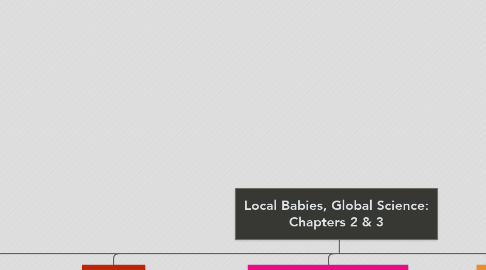
1. Georgette
1.1. Infertile throughout her marriage
1.1.1. Infertility is both ovarian and fallopian-related
1.1.2. Her age is advancing; she is 38 and has been trying for 14 years to get pregnant.
1.2. Undergoing many rounds of IVF
1.2.1. Georgette maintains a business with her husband, handles the calculations, and runs her own importing business.
2. Cultural Importance of Children
2.1. Egyptian culture sees having children as exceptionally important, especially for the wealthy.
2.1.1. Family places great pressure for member to have children.
2.1.2. It is necessary to have children to pass your wealth and business onto.
2.2. Adoption is not an option
2.2.1. Parents often feel wary of this because they fear they will not love an adopted child as if their own biological child.
2.2.2. It is viewed as taking care of someone else's child, and not having their own.
2.3. Cultural precedence of children puts much pressure on the society
2.3.1. This pressure is particularly felt by the infertile, who feel shame and desperation to be a part of the society in this way.
2.3.2. Childless families are viewed entirely differently than in the West.
3. The Role of Globalization
3.1. Money buys options, regardless of how far they may be, they can be purchased, even regarding making babies.
3.1.1. The globalization of the availability of IVF made it possible to be offered as an option in Egypt.
3.1.2. Because those in treatment are typically wealthy, money is not a limiting factor. If they desire, they have the option to travel abroad, to Europe or the USA to seek even more advanced fertility treatments.
3.1.2.1. Technology is Global
3.1.2.1.1. For those who can afford it, medical technology can be purchased
3.1.3. IVF is more affordable in Egypt than in many other places; especially in the US and Europe.
3.2. Egypt is a Middle Eastern hotspot for fertility treatments between the cultural significance of being a Muslim nation, having very advanced technology, and being a major travel hub. There are luxurious amenities, air conditioned hotels, and many Arabic doctors opt to take advantage of the advanced medical training available in Egypt.
4. Mikhail
4.1. Experieincing infertility
4.1.1. Very common in Egyptian males as they age due to lifestyle and smoking.
5. IVF in Egypt
5.1. Typically a luxury of the wealthy
5.1.1. Highly expensive treatment, paid for out-of-pocket
5.1.2. Elitist status
5.2. The poor are typically excluded from access to these technologies. "They do not deserve to be mothers, especially to test tube babies"
5.2.1. Infertility clinics exist, but IVF is not really offered for free
5.2.2. People of lower social classes often go to extreme measures to be able to find the money for IVF treatment; borrowing money from family members, or selling off all valuables.
5.2.3. It is generally considered, that if you cannot afford IVF, you cannot afford to have children, therefore, IVF is not for you.
5.3. Risk
5.3.1. IVF comes with a lot of risk; there is absolutely no guarantee, and those who go through the trials, are often unsuccessful.
5.3.2. Not much is mentioned of what the women's bodies experience later on as a result of the intensive drugs and surgeries they are put through.
6. Mabruka
6.1. Infertile
6.1.1. Mabruka is from the lower=class
6.1.2. Determined to find the root of her problem
6.1.3. Has experienced ovarian/ fertility problems for many years.
6.2. Due to her lack of education, her doctors renounce her problems as "weakness" and say no more.
6.2.1. She is not sophisticated, therefore does not delve deeper in her questioning, provoking answers.
6.2.2. She feels she is failed by the doctors because they withheld important info from her.
6.3. She faces criticism and fear-mongering from her husband's family as a result of her fertility problems.
6.3.1. Shame is imposed even though this problem is not her fault.
6.3.2. Family members can be extremely critical and judgmental in such situations.
6.3.3. Hre husband is wary of how much money she "wastes" in her conquest to become pregnant to no avail.
6.3.3.1. Ragab, her husband, is not supportive. He has a tendency to be ignorant and is not a full-time participant in her treatment.
6.3.3.1.1. She feels as if her husband's love for her is fading due to her lack of ability to conceive. He longs for children and she fears losing him.
7. Science/ Culture Conflict
7.1. Reproductive technology intimidates people because it challenges their cultural beliefs. Science is not fully understood for many, and many do not accept it when it conflicts with their beliefs.
7.1.1. Belief/ Knowledge are not the same thing, though in rural Egypt, they are blended and it becomes difficult for people to view technology welcomingly
7.1.1.1. Those who are in the position of dealing with infertility typically seek as much knowledge as possible in an effort to overcome it. This is much more possible for those who are elite and literate.
7.1.1.2. Their patriarchal perspective gives all the power in procreation to men; women are not considered as part of the joint venture of bringing children into the world
7.1.1.2.1. At the same time, while the men are credited for depositing the embryo-carrying sperm into women's waiting wombs, women are vilified for their infertility struggles. All the while, male infertility is not openly discussed.
